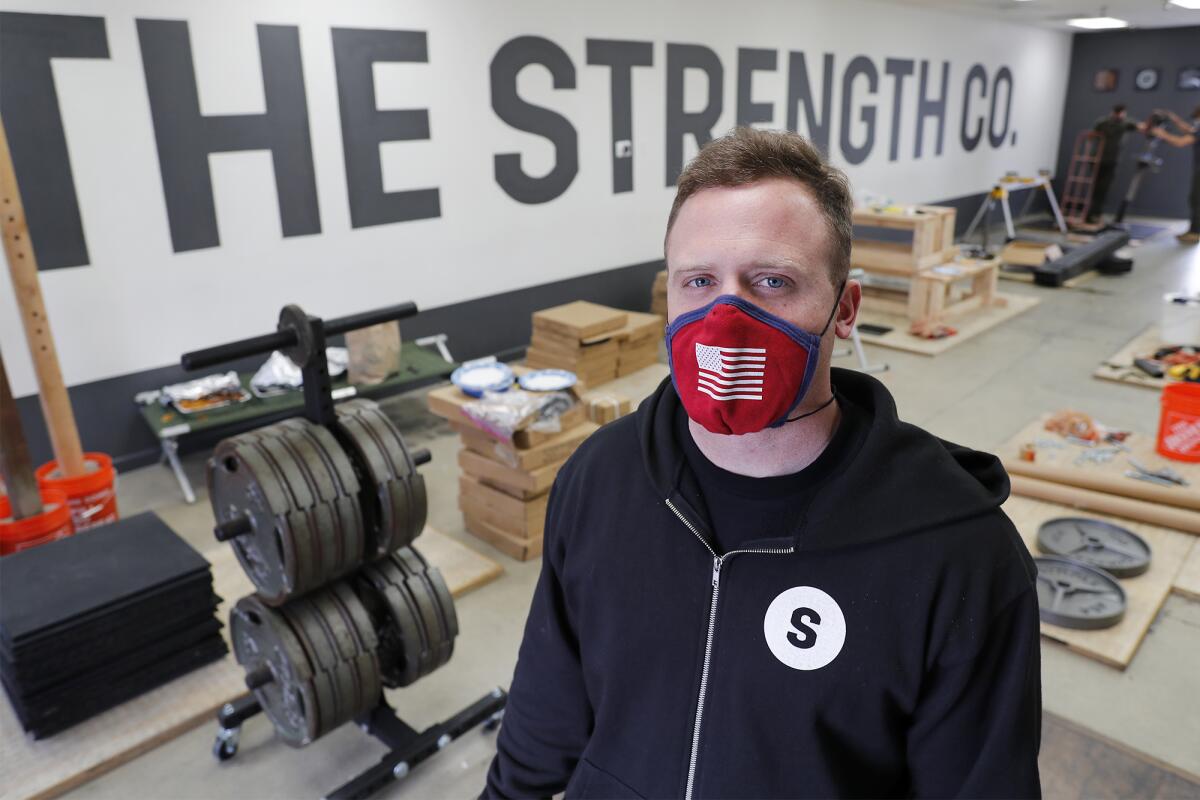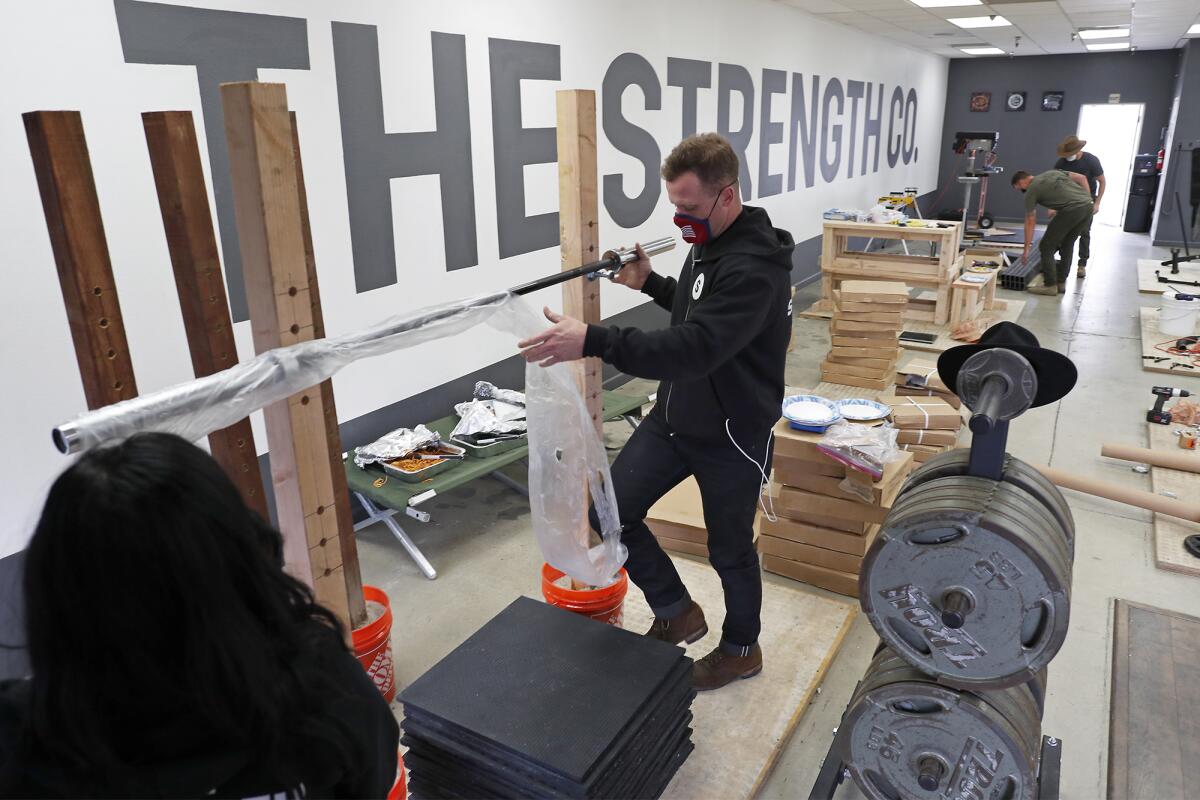From garages to gyms: How one Costa Mesa gym is surviving the coronavirus pandemic

When a global pandemic hits and all nonessential businesses must close, what’s a local gym to do?
Why, turn into a Zoom-coaching, squat-rack-manufacturing, mask-making business, of course.
At least, that seemed like the natural answer for Grant Broggi, owner of the Strength Co., a 150-member strong gym in Costa Mesa. The day Orange County banned all nonessential gatherings outside the home, Broggi called his team together. With military precision honed during his nine years as a Marine, he gave new marching orders.
“As soon as it happened, it reminded me of being deployed to Afghanistan. People need leadership right now,” said Broggi, 31. “Tomorrow we’re going to take everything out of the gyms and we‘re going to start delivering it to people with homes.”
At 9 sharp the next morning, the Strength Co. coaches rolled up to Ashley Bolduc’s Santa Ana home, bringing with them two truckloads containing a squat rack, weights, safety apparatus and even her favorite belt.
“The fact that I can walk out my back door, go into my garage, do my full routine and then come back in, take a shower and be done is amazing,” said Bolduc, a 33-year-old lawyer. “I haven’t lost the ability to maintain strength or gain strength because the Strength Co. and ... all the coaches have given up their time and their money and their assets to make sure that we’re all taken care of and sticking to our goals.”
Broggi’s team emptied its gyms in Costa Mesa and Villa Park into people’s garages, living rooms and patios across Orange County. Coach Connor King began designing workouts to do remotely, complete with a Zoom Starter Guide to show people how to set up their cameras to show the best angles of their squats. Others shot promotional videos and blasted social media with the updated gym schedule. Another called all 150 gym members to ask, simply, “How are you?”
“People need to work out right now, they don’t need to sit on their couch or watch Tiger King,” Broggi said, referring to a popular Netflix show. “They need to exercise for their brain, for their mental health.”
While his team dismantled and distributed the gym, Broggi started stockpiling. He went around to multiple local gyms, asking to rent their bars while the place was closed. He pinged warehouses across Southern California for their equipment. By the third day, he had collected 4,200 pounds of weights.
Requests for equipment kept pouring in, and Broggi soon had more weights than available squat racks and benches. He enlisted a Marine buddy to rig a rack and bench set from two buckets of concrete and several planks of wood.
A Marine running a training camp called to ask for workout help for his group of marines. A gym owner in Mexico rang, asking for the blueprint so he could replicate it.
As of Thursday, 108 people — both gym members and nonmembers — had requested equipment, including 48 of the homemade squat racks. Many were strangers, whose familiarity with the equipment varied. Broggi wanted an option, besides the wooden contraption, to give to people.
“How much would steel cost?” he asked.
“That’s when the game really changed.”

Almost overnight, the Costa Mesa gym transformed into a weight rack manufacturing company. Although Broggi gave his gym members the equipment for free, he began charging for others: $399 for steel racks, $199 for wooden racks, $50 for a bench. For $150 per month, anyone can rent 220 pounds in weights. For folks who can’t afford it, Broggi may offer discounts or work out a deal.
“I have no idea how this is going to work out business-wise, I’ve risked it all,” Broggi said. “I’m all in. I think that if you just genuinely take care of people, I don‘t see how it could [turn out] bad.”
Broggi reached out to other small business owner friends, offering to hire laid-off employees for $15 per hour to help with his operation. He called his barber, Diana Mendoza, 29, who had just lost her job at the salon.
“Want a job?” he asked.
“I was like, sure. But I had no idea what I was getting myself into,” Mendoza laughed. “Every day, it’s so different. I go home and then I come back in the morning and they’re like, ‘Today we’re going do this.’ And I’m like ‘OK, let’s just do it.’”
On Thursday morning, the challenge was to design a steel rack that could be dismantled for easy shipping. Earlier, it was updating the website to include the Strength Co.’s latest merchandise venture: face masks.
Through a friend’s recommendation, Broggi hired J. Santos Sanchez, who sews about 200 masks per day. For each $15 mask sold online, Broggi plans to donate one to employees at Stater Bros. grocery stores.
Meanwhile, gym members — either original, or absorbed through the gym’s transformation — keep on working out. King, who teaches special education at Fountain Valley High School during the day, coaches via Zoom.
“It’s been funny to see how people’s lives have been turned upside down, but this gives them a normalcy, this gives them something to focus on,” said King, 28. “There’s value in doing something that’s hard. I’d be going crazy if I didn’t have that right now.”
When Brian Davis, a 37-year-old healthcare worker from Newport Beach, can’t make it to King’s class, he still works out in his makeshift gym in the garage. Usually, his 3-year-old daughter Cameron joins him, and her cheerleading from the sidelines — “Daddy, you’re so strong.” — is a “silver lining” for him.
In some ways, he said, the home workouts are more difficult than those in the gym.
“It’s easier to go into a gym where there’s energy and people and noise and lights. It’s a lot harder to go into your cold, dark garage at 5 o’clock in the morning and put heavy weight on your back,” Davis said. “It may be not as great, but the mental training is exponentially better, because it is 100% accountability on yourself and the mental training to focus is ... a big component too.”
All the latest on Orange County from Orange County.
Get our free TimesOC newsletter.
You may occasionally receive promotional content from the Daily Pilot.




